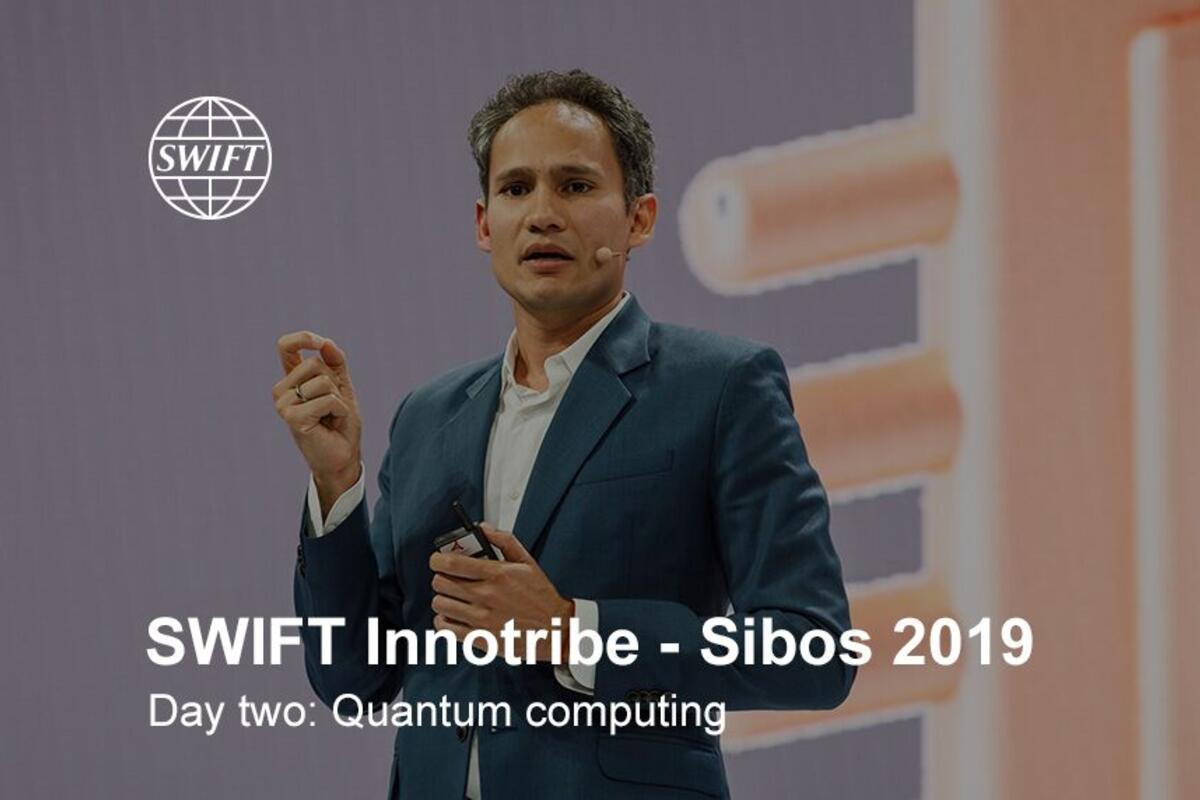Day two of Innotribe at Sibos 2018 Sydney
The pace, scale and range of the challenges and opportunities offered up by the fourth industrial revolution can at times be dizzying. With every opportunity for financial services to deliver greater value through digital technology, comes not only competitive but also security risks to be identified, understood, and wrestled to the ground.
Should we view quantum computing as a multiplier with the power to accelerate innovation? Or another source of disruption that promises more than it can realistically deliver? Innotribe at Sibos 2018 in Sydney devoted a full day to deepening the discussion.
“History tells us that new physics rapidly, in the blink of an eye, leads to revolutions in technology,” said David Reilly, professor at University of Sydney’s School of Physics, in Tuesday’s opening session, ‘Quantum computing: Separating fact from fiction’. “The real challenge is that we’re thinking about how to build machines to make money, while we’re still working out the basic physics,” continued Reilly, a specialist in quantum nanoscience and principal researcher at Microsoft Quantum – Sydney.
Out of the lab; into business
Quantum computing is upon us. Physicists are building quantum computers even as they try to work out their likely impacts. “This is very real,” said day anchor Dr Leda Glyptis, chief of staff at digital banking consultancy 11FS, introducing a series of sessions on quantum computing today, tomorrow and the day after. The sessions confirmed that much of what we need to harness the quantum computing revolution is here already. Next, we need to understand it, to begin to use it and, as Reilly said, to make money from its use.

But where do we start? More urgently, for firms that have not yet started, are we too late? No, according to Dr Alejandro Perdomo-Ortiz, senior research scientist at Rigetti, a US firm which has developed a ‘quantum-first’ integrated cloud platform. The current state of quantum science may best be characterised as “quantum readiness”; the technology has been born, so to speak, but it’s not yet out of the nursery. This is the time to see the benefit of being the first to use this technology, and to help define its first steps,” said Perdomo-Ortiz.
Quantum computing may confer a significant first-mover advantage – and by implication some measure of second-mover disadvantage – to firms alert to a technology that potentially outstrips classical computing in a range of key areas. But the benefits are still in the conversation, not yet in the competition. There are only the beginnings of consensus on how and where quantum can be most usefully applied.
Innotribe 2018’s Tuesday programme ignited a conversation that requires as much urgent attention within the financial services sector as in the campuses of academia and technology firms. We need to understand and to act, even though there is not (yet) a quantum bank poised to take our business. “Before we have defined the quantum applications; this is the best time to join the conversation,” said Permodo-Ortiz. We have the freedom to co-operate – sharing ideas on the challenges that quantum computing should be addressing – because we can’t yet compete.
Disruption – but not as we know it
What are the next (baby) steps? “We have the devices, we can programme them, we can play with them,” said Perdomo-Ortiz. If quantum is still in the nursery, then we can at least explore its potential via a sandbox. But another point raised ahead of Tuesday evening’s lively curated-networking session was simply that we’ve been here before, with other ‘transformational’ technologies. Is there a possibility of fatigue? We have faced the pros and cons of digital innovation, with varying degrees of success to date. Whilst the financial services industry is still getting to grips with digital currencies, artificial intelligence et al, “What happens if we don’t come to the table for this conversation?” asked Glyptis.

Short answer: we get disrupted. But this is not disruption as we have come to know it. Quantum computing will not replace classical computing applications. Rather it will connect with and augment them. Quantum computing, once understood and applied, has the potential to add value through scale and speed of unprecedented magnitude. It’s a mechanism for handling ever-bigger data sets, for example. Quantum is a potentially game-changing innovation that keeps most of the game’s pieces intact, and – to over-stretch the analogy – makes it more attractive to customers.
Early as we are in the product lifecycle of quantum computing, it’s nevertheless possible to map an approach to innovation that draws more on the banker’s skillset than on the scientist’s. For financial institutions, the possibilities are mouth-watering and practically limitless. The primary opportunity may be to access systems that are faster, more secure and both more comprehensive and more granular in their analysis. From this, we can trace a direct path to new products and services, as well as new types of partnerships between organisations.
Cause for urgency
We’re early enough in quantum’s development to optimise its potential, and its scope for change is far and wide. But don’t relax: there is cause for urgency. Asked about the time horizon for organisations to start thinking about engagement, upskilling and prioritisation, Dr Stacey Jeffery, senior researcher at CWI, the national research institute for mathematics and computer science in the Netherlands, gave the understatement of the day. “A lot of the security solutions that we have right now will be broken by quantum computers. This might be the gateway to starting to care about quantum computing.”

The risk of quantum falling into the wrong hands might well stir the complacent. However secure our systems, chances are that somebody, somewhere is working on a quantum computer to find a way through our defences. “It’s the first most urgent thing,” Jeffery confirmed. With that in mind, perhaps the fact that current and near-future quantum computing can be cloud-based – thus reducing cost barriers to entry – wasn’t quite as reassuring as it might otherwise have been.
There is one barrier to entry, however. Not enough of us understand quantum computing; there aren’t enough quantum scientists. “The biggest barrier to entry is the talent barrier. There is an extreme shortage of people with an understanding of the technology,” said Dr Ashley Montanaro, founding consultant at quantum advisory firm Q&I. But even this isn’t going to last. There are, he continued, “initiatives all over the world” to train quantum scientists. The technology’s here already, and the scientists will be graduating soon.
Come to the table. First to secure your systems and then to secure your future, shouldn’t you join the quantum conversation?
Videos
Day 2: Session wrapups
Quantum Computing: separating fact from fiction
Quantum the day after tomorrow
The impact of quantum on financial services
Sibos TV: Leda Glyptis & Anna Phan
Follow our participants
Leda Glyptis
Alejandro Perdomo-Ortiz
Ashley Montenaro
Anna Phan



